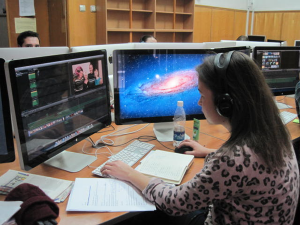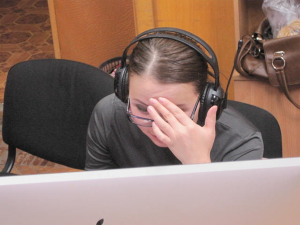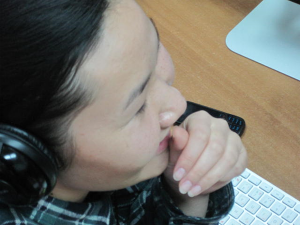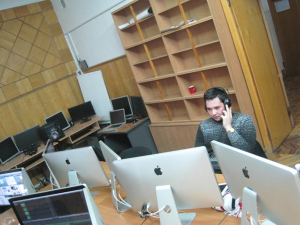 It is two weeks before the end of fall semester. Two weeks until I will return to the United States and close out my year of teaching journalism and storytelling here in Bishkek, Kyrgyzstan, a Central Asian nation slightly smaller than South Dakota. Soon I will return to my beloved Flagstaff. But today I am here in these tender days of goodbye.
It is two weeks before the end of fall semester. Two weeks until I will return to the United States and close out my year of teaching journalism and storytelling here in Bishkek, Kyrgyzstan, a Central Asian nation slightly smaller than South Dakota. Soon I will return to my beloved Flagstaff. But today I am here in these tender days of goodbye.
I teach three courses at the university; digital storytelling has become my favorite. The idea of the class is to tell first-person stories using layers of words, sound, images. Why? Everyone has stories to tell. Everyone has stories that need to be listened to. And making stuff is really, really fun.
On Monday and Wednesday afternoons 28 students crowd into the computer lab. I talk about stories. We look at stories. They make stories. Through all of this they learn to edit, to organize, to synthesize language with image, to sharpen their digital literacy skills. But that’s the teachery stuff. What they really learn is what they say has value. That their lives have meaning that extends beyond the boundaries of the self.
 The final assignment for the class is a three-minute story. It is to be a story that pulses inside them and a story with an underlying emotional truth. The deadline for this project is tomorrow.
The final assignment for the class is a three-minute story. It is to be a story that pulses inside them and a story with an underlying emotional truth. The deadline for this project is tomorrow.
This morning, a Sunday, I walk through empty and icy city streets to the university. Snow covers the ground, a frenzy of birds swoops overhead against a milky sky. I cut through the park beside the Parliament Building. I cross behind the main square, Ala-Too, and pass the three-story-tall statue of Lenin, whose outstretched hand points toward the university.
 I open the media lab, and in they come. I pull my chair beside each one to listen, to guide, to critique. I pull my chair beside each to honor them, to encourage them and to say to them that their stories have meaning and depth and importance. And they do.
I open the media lab, and in they come. I pull my chair beside each one to listen, to guide, to critique. I pull my chair beside each to honor them, to encourage them and to say to them that their stories have meaning and depth and importance. And they do.
Masha tells of her grandmother Svetlana left in a basket somewhere in Siberia at the end of World War II. A Russian couple takes the baby and flees to Kazakhstan to raise her. Sepia-toned photos flicker on the screen as Masha’s narration talks about not knowing who she is, not being able to trace the line back before her grandmother and see the branches of her family tree.
In a soft and melancholy voice Alina tells the story of her older brother Chingiz, a clever and troubled boy who drowned when he was a teenager. Alina says his memory inspires her to recognize and seek happiness.
Binafsha’s story is about her mother, an Afghan woman, who was denied an education. In her story Binafsha says that when her mother was a girl, she would stand in the doorway of her house and watch with yearning as schoolchildren passed in the morning on their way to their studies. Binafsha’s story hints at bearing the weight and privilege of all of her mother’s hopes and the accomplishment she seeks to feel when she hands her diploma to her mother next spring.
 Ismail tells of his grandfather, a famous Kyrgyz theater director who made a decision that changed the course of his life. Umut tells of being born with weak eyes, years of surgeries and her fear of going blind. Saikal’s story is about surviving years of self destruction and the scars her body bears.
Ismail tells of his grandfather, a famous Kyrgyz theater director who made a decision that changed the course of his life. Umut tells of being born with weak eyes, years of surgeries and her fear of going blind. Saikal’s story is about surviving years of self destruction and the scars her body bears.
When I look at my watch, six hours have passed.
As I walk home I grow soft thinking about their tentative courage and their guileless stories. They have chosen to tell of love and of loss, of failure and of heartbreak, of gratitude and triumph. Their stories remind me again that we are all the same, all of us, from all over this wild and woolly world: We grieve. We try. We love. We lose. We honor those who came before us. We strive to become as whole as we can. We lurch toward making sense of it all.
Today was better than any farewell party I could conjure. Today we worked together, which is what drew me most to teaching journalism. To work with the work is the doorway into the deepest and most satisfying connection I can make with a student. And through these stories I see into their lives and into other worlds.
And I am forever changed.
The digital stories of Laura Kelly’s students can be viewed on the YouTube channel AUCA Digital Stories 2104. For more from Laura and her stay in Kyrygzstan, see her blog at www.untidyexuberances.com.

